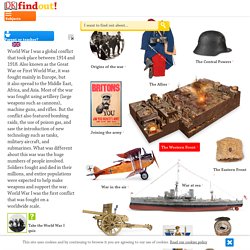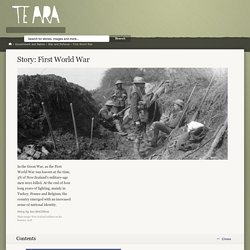

World War One. Supported by over 500 historical sources from across Europe, this resource examines key themes in the history of World War One. Explore a wealth of original source material, over 50 newly-commissioned articles written by historians, teachers' notes and more to discover how war affected people on different sides of the conflict. World War I History - World War I. Tensions had been brewing throughout Europe–especially in the troubled Balkan region of southeast Europe–for years before World War I actually broke out.

A number of alliances involving European powers, the Ottoman Empire, Russia and other parties had existed for years, but political instability in the Balkans (particularly Bosnia, Serbia and Herzegovina) threatened to destroy these agreements. The spark that ignited World War I was struck in Sarajevo, Bosnia, where Archduke Franz Ferdinand—heir to the Austro-Hungarian Empire—was shot to death along with his wife Sophie by the Serbian nationalist Gavrilo Princip on June 28, 1914. Princip and other nationalists were struggling to end Austro-Hungarian rule over Bosnia and Herzegovina. But because Russia supported Serbia, Austria-Hungary waited to declare war until its leaders received assurance from German leader Kaiser Wilhelm II that Germany would support their cause.
WW100 New Zealand. First World War. World War One on TV and Radio. First World War Facts. Origins of the war › World War I began after the fatal shooting of Archduke Franz Ferdinand, heir to the Austro-Hungarian throne, in Sarajevo.

Origins of World War I › The Allies › The Allied powers consisted of France, Britain, Russia, and their supporters. The Allies of World War I › The Central Powers › The Central Powers fought against the Allied powers. The Central Powers of World War I › Joining the army › Huge numbers of soldiers stepped forward to fight the war on all sides. Joining the army › The Western Front › Much of the fighting in World War I was in France, or the Western Front. The Western Front › The Eastern Front › War on the Eastern Front saw the great armies of Germany and Austria-Hungary battle against Russia.
Topic Explorer for Schools. Topic Explorer for Schools. First World War. Origins The First World War was caused by the destabilisation of the balance of power in Europe due to the rise of Germany.

The war began in 1914 when Austria-Hungary invaded Serbia because of the assassination of an archduke. Countries had made alliances with each other, and soon most of Europe was at war. New Zealand was part of the British Empire, and when Britain declared war on Germany, in August 1914, that meant New Zealand was at war too. The two sides were called the Central Powers (Germany, Austria-Hungary) and the Allies, which included the British Empire, Russia and France. New Zealand enters the war New Zealand decided to send soldiers to fight in the war for a number of reasons, including New Zealand’s strong ties to Britain and its concern with keeping trade routes open so it could continue to export to Britain. Within a month New Zealand troops had occupied Western Samoa, which was a German territory. Gallipoli Turkey had entered the war on the Central Powers side. National : Programmes : New Zealand in World War I. NZHistory, New Zealand history online.
The World War I Collection. School.ebonline.co. The war to end all wars. World War I - Battles, Facts, Videos & Pictures - History.com.